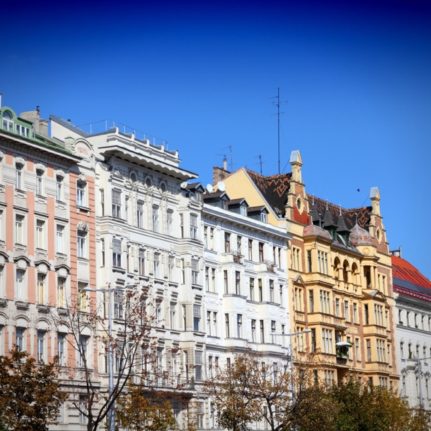Moving to a new city and living in a different country can be challenging, especially if you are still learning the local language. Luckily, there are many tech tools that foreigners can use to help them adjust to a new life abroad.
Some free smartphone apps you can download and always have with you will make life easier in Vienna – even if you have been living in the Austrian capital for years.
From things to help you set up as a resident, to navigate better in the city you live and even find some food when all supermarkets are closed on Sundays, here are the apps you should download if you live in Vienna.
Stadt Wien
The Stadt Wien app is the official application of the City of Vienna. It brings essential news and pushes notifications on traffic disruption near you, weather alerts or civil emergencies.
There is also a detailed city map where you can search for drinking fountains, coronavirus test streets, fuel stations, parks, and more.
READ ALSO: Vienna vs Graz: Which city is better for foreign residents?
The app’s search function works much better than Vienna’s website, and you can use it to navigate and find pages on topics of interest – it will send you directly to the right official page online.
WienMobil
This is the official app of the Wiener Linien – Vienna’s public transport operator – making it an essential tool for anyone living in the capital city or the surrounding area.
The WienMobil app covers all forms of transport in the city, from trains to buses and ride-sharing vehicles, and shows the different forms of transportation available for a selected route.
READ ALSO: The smartphone apps that make living in Austria easier
Tickets can even be purchased and stored in the app, meaning users don’t have to carry a physical ticket when going about their daily lives.
WienMobil’s transport partners include Citybike Wien, Europcar, Taxi 31300 and Westbahn.
ÖBB
ÖBB is Austria’s national rail operator and the ÖBB app is helpful for anyone that regularly travels by train in Austria – or for anyone visiting the country.
Users can purchase tickets within the app and receive notifications about delays or changes to a service and view information about platforms at specific train stations.
READ ALSO: One day in Vienna: How to spend 24 hours in the Austrian capital
City, weekly and monthly tickets can also be purchased in the ÖBB app.
WienBot
The WienBot app is quite the find for Vienna residents and is literally what it says: a bot. The artificial intelligence bot is in English (if your phone settings are in English) and will answer any questions you have about life in the Austrian capital.
It also works with keywords. So, for example, if you type “coronavirus”, it will bring up a series of messages with short explanations about the disease, hotlines for you to call, a website where you can get more information on vaccinations and the official Stadt Wien page with all aggregated info on Covid-19. It then suggests other keywords (such as quarantine, contact persons, and free testing) you can click to read more on.
READ ALSO: 23 essential articles to help you navigate life in Austria
You can also type other things, for example, “theatre”, and the bot will bring up a series of theatre events happening in Vienna.
Sag’s Wien
Is the street light in your neighbourhood broken? Or maybe some rubbish hasn’t been cleaned out next to your home? You can let the City of Vienna know about these and other issues with the Sag’s Wien (something like “tell Vienna”) app.
READ ALSO: The downsides of Vienna you should be aware of before moving there
The app is pretty straightforward. You just click on “report new issue”, choose which category it belongs to (public lighting, traffic lights, green area, etc.), and a map with your location will open up. You can then pinpoint the exact place you need, post pictures, and leave a comment about the problem.
It’s also possible to follow up on the issues and see a map with what has been reported and what’s the status of the complaints.

Handy-Signatur
Before the pandemic, the Handy-Signatur was a little-known app that most people didn’t understand, let alone use.
Then the Covid-19 Green Pass was rolled out, along with many other digital services, and the Handy-Signatur suddenly became an essential app.
FOR MEMBERS: EXPLAINED: What is Austria’s Handy-Signatur and how does it work?
But what is it exactly?
The Handy-Signatur is essentially a mobile phone (known as a Handy, in German) signature which turns your phone into a virtual ID card. It allows you to legally sign official documents without having to print them out and sign them by hand. It also allows you to easily log in to official sites, including those to retrieve vaccination certificates and the tax office site.
The Local Austria news app
You might be used to scouring The Local Austria every morning for your daily hit of Austrian language and culture or receiving our newsletter. But what about getting alerts straight to your phone when we produce new content? Sounds pretty good, right?
Luckily for you, The Local has a free smartphone app which you can access content from all nine countries we cover so that you can keep up to date on both Austria and wider Europe.
It’s available on Apple and Android phones and will be an indispensable guide to living the Austrian lifestyle.
Language apps
Of course, living in Vienna will be much easier if you speak the local language. There are many apps to help you learn German (Duolingo, Mondly, and Babbel are just some of the most popular ones) for free – some of them are even fun.
READ ALSO: The German language you need for summer in Austria
A translation app can also be useful. The most popular one, Google Translate, works decently (but not perfectly) with English – German translations. It has valuable tools, including a live translation one that can translate text in real-time with your phone’s camera.
Food apps
Lieferando and Mjam are two popular food delivery apps that will save your dinner cravings. They work with several restaurants and shops in Vienna and will deliver to addresses in the city and some of its surroundings.
READ ALSO: Caffeine, war and Freud: A history of Vienna’s iconic coffee houses
Recently, and especially with the coronavirus pandemic, services that deliver groceries have also become very popular in Austria.
A great app is Gurkerl, with large assortments of food and beverages (they also have a lot of vegan options). Alfies is also another popular app for groceries delivery. It has fewer options, but it delivers faster, until late at night (1 am on Fridays) and on Sundays as well.
Are there any apps we missed for living in Vienna? Please let us know in the comments section below or email us at [email protected]



 Please whitelist us to continue reading.
Please whitelist us to continue reading.
Member comments